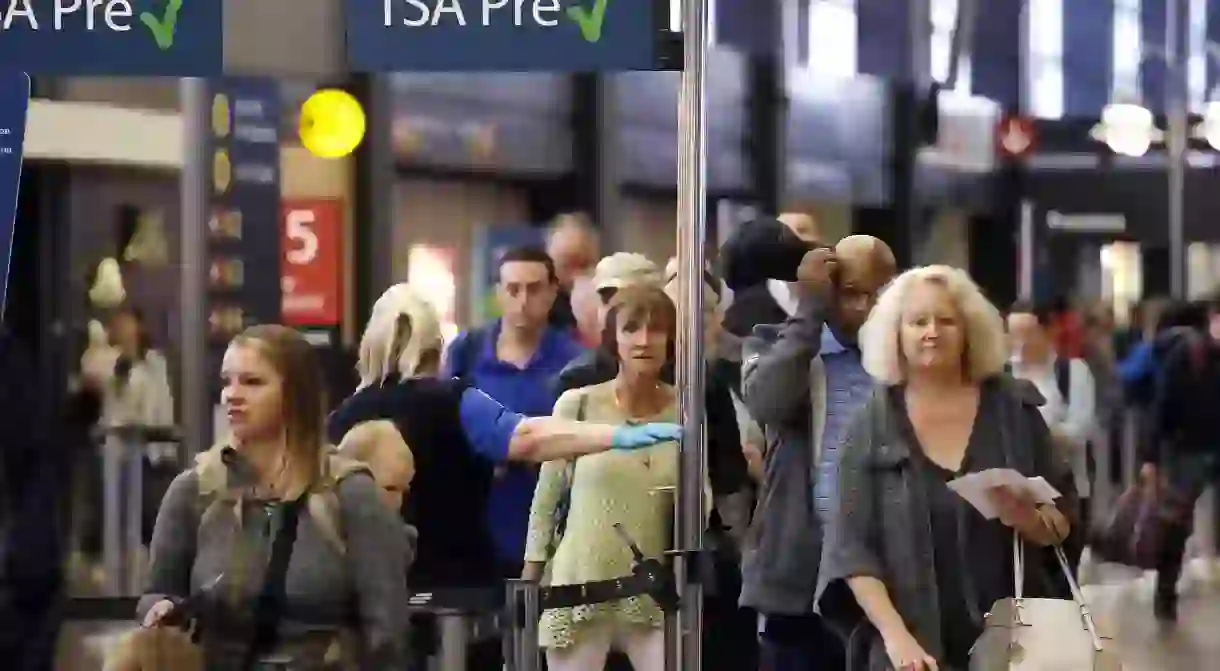After the United Debacle, You Need to Know Your Rights in the Airport

In recent months we’ve seen travel bans, immigrants detained, passengers thrown off flights, and large protests at airports. Many of those news stories left travelers asking what their rights are when they’re either arriving in or departing from America.
Recently, United Airlines violently ejected a passenger from a flight because it was overbooked and the airline wanted some of its own employees to take the seats. The passenger was left with a concussion and broken teeth.
Travelers can be ejected from the flight if the captain feels you’re a danger to the rest of the passengers and crew. Airlines are also able to bar passengers from boarding. But if a passenger is boarded, ready to disembark, and not a danger, then airlines may not be able to justify throwing them off the plane.

“United is incorrectly citing the denied boarding compensation rule in its COC, and the federal rule upon which it is based [14 CFR 250.5], to justify requiring a passenger who has already been permitted to board and taken a seat to involuntarily disembark,” John F. Banzhaf III, a professor of public interest law at the George Washington University Law School, wrote in an opinion piece.
That federal rule only applies if an airline wants to deny a passenger from boarding, not to remove one from an already boarded airplane.
Donald Trump’s recent attempts to instill a travel ban on people from certain countries has appalled large parts of the free world. Trump’s recent missile strike on Syria means America is currently bombing a country while at the same time refusing to offer shelter to anyone affected by the evil Trump claims to be fighting.
The major criticism of Trump’s ban is that it discriminates based on religion. The President’s administration claims that the ban is purely location-based, but has only been placed on Muslim-majority countries.
Religious and political beliefs are protected by the First Amendment, even within an airport. But the American Civil Liberties Union (ACLU) says that customs officers have sometimes asked travelers about their religious and political affiliations and opinions. For non-citizen visa holders, declining to answer a question about religious beliefs or political opinions may lead to more questioning or denial of entry into the U.S.
A new proposal suggests customs officials should be able to demand passwords for devices like laptops and phones, and also access to social network accounts.
U.S. Security Secretary John Kelly recently called for all foreign visitors to hand over their passwords and list which sites they visit. “If they don’t want to give us that information, then they don’t come,” he told the House Homeland Security Committee.
The ACLU says that customs officers have asked for these passwords, or for travelers to unlock devices for them, in the past. The right to decline a request like that is a contested legal issue. American citizens who refuse to provide passwords or unlock devices cannot be denied entry to the country, but it’s a different matter for non-citizens. U.S. Permanent residents and non-citizen visa holders can be denied entry if they don’t cooperate with these types of requests.
“The issue with electronic devices is that there has been a longstanding exception to the 4th amendment that allows border agents to search our possessions without suspicion,” says Esha Bhandari, staff attorney at the ACLU. “The problem is now laptops and devices have a lot of private and personal information on them.”
Bhandari adds that court decisions over the privacy rights of electronic devices have gone different ways, but even a quick spot search of a smartphone could give a customs officer access to a person’s private data.
“We’re very concerned at the social media password proposal,” says Bhandari. “That has an impact on freedom of expression and privacy rights. If that becomes the norm for international travel, it could be something for American citizens traveling in the future.”
The ACLU has seen a marked increase in electronic device searches in the last year, a period that includes the latter months of the Obama administration as well as Trump’s reign.













